My kids make fun of me when I say that I love seeing Shakespeare in other languages — some of my recent favorites have been in Dutch, Czech, and French, but I’m up for whatever I can find. I think it has to do with being released from cliche into experiment. In The Tempest last night, when that old saw about what dreams are made on gets translated into Korean, you can be pretty sure it’s not going to be the same as any of the other times you’ve heard it.
The Mokwha Repertory Company’s production of The Tempest, part two ofThe Tide is Rising, La MaMa’s three-part collection of fall Tempests, starts with a wonderful swirl of linen and music, a drum-structured storm-dance that presents the shipwreck as a collective performance of disorientation, with actors rising, staggering, falling, and dancing their way around a crowded stage. I loved the way the company’s minimal props — a drum on the balcony and white sheets flowing through everyone’s hands — generated so much fluid motion and confusion. I think this scene is one of the hardest to perform, and I’m not sure I’ve ever seen a production that really hits it just right, but the Mokwha company were pretty close.
I didn’t know anything about the company when I sat down in the Ellen Stewert Theater on East 4th St last night. The program notes say that they were founded in 1984 and employ traditional Korean techniques, which clearly include music, dance, and something quite close to martial arts. I found a little more about them online this morning, courtesy (of course!) of the brilliant Professor Huang, who brought students to see the company in DC in 2011.
I especially loved Youngkwang Song’s angry Prospero, who raged his way through several scenes that often, in more traditional versions (including part 1 of La MaMa’s grou, which I saw in the same theater earlier this fall), can be a bit flat or expositional. This was a Prospero who wanted to eat his enemies raw, and who only calmed himself slowly over the course of the play.
The task of reducing the magician’s rage fell to Wonjun Jo’s dancing Ariel, to a wonderfully goofy two-bodied Caliban, performed by Seungyeol Lee and Minji Lim as a conjoined twin, finally liberated at the end of the play when freedom became in style, and most of all (I thought) to Yeonju Jung’s wide-eyed, emotionally compelling Miranda, who I thought was the real heart of the play. Bantering with her father, oogling the lovely form of the sleeping Prince, playing with the spirit-animals, who roamed the stage with heads like ducks, mice, or pigs, this Miranda wormed herself wide-eyed into the play’s core. I’ve never seen a better performance of this difficult part.
That’s what you get for changing things up!
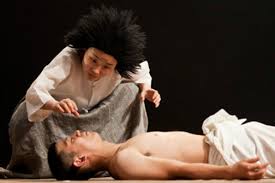
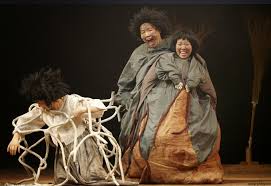
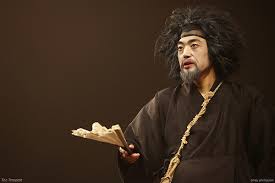
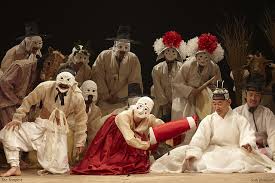
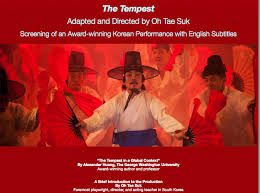
I saw this performance last night and it was INCREDIBLE. I do not know much about Shakespeare, and being of Korean heritage, it was simply astounding to be able to feel such strong elements of Korean folklore intertwined with a Shakespearean plot line. I have to say that the Korean subtitles did not always do the script justice and did not always faithfully encapsulate the Korean “slang” or at least the familiar Korean tone used when joshing around or making a particular witty phrase. But I must say that the Korean script was very well done, and I was moved to tears as Prospero, during a soliloquy, tried to explain why his rage was so particularly malevolent (the imagery of him clinging onto a young child in a sinking boat). His acting blew me away. Furthermore, those who are not familiar with the Korean culture will get a taste of something they can’t quite understand–the overwhelming tone of “Korean-ness” was incredibly well done (the use of characters, the type of banter, the use of song and music). This was an incredible performance. All I could say at the end was, “Wow.”